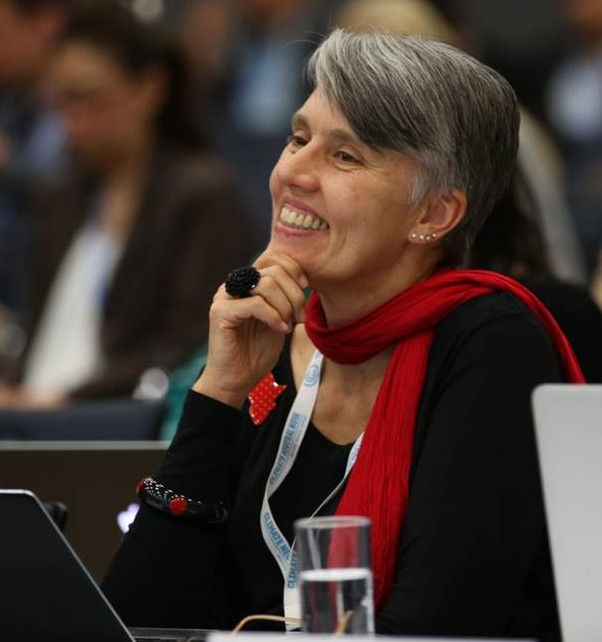South African scientist hopes to head world’s most important climate change body
Debra Roberts is running for the position of chair of the Intergovernmental Panel on Climate Change

Debra Roberts hopes to be elected chair of the IPCC in late July. Photo supplied
Professor Debra Roberts, the Durban-based climate researcher who is running for the position of chair of the Intergovernmental Panel on Climate Change (IPCC), says that you no longer need to beat the climate drum; the impact of climate change is already here.
Roberts will become the first woman from Africa to chair the IPCC, if she wins the elections next month in Nairobi.
The IPCC is arguably the most important institution in the world tackling climate change. It is a United Nations body and every country on the planet is a member. It produces definitive scientific reports on climate change.
Speaking to GroundUp, Roberts said African scientists were increasingly being recognised and considered for leadership positions. “Science from Africa has become influential, it is respected on the global stage, and scientists from a broad variety of disciplines are generating knowledge that is useful in the global debate.”
Roberts has three decades of experience as an academic and senior municipal planning official. She has co-chaired the IPCC’s Working Group II, which focuses on how to adapt to climate change. She was Durban’s first Chief Resilience Officer, responsible for overseeing the development of the city’s strategy on resilience to climate change.
Roberts said the effects of climate change are already being felt. She cites the devastating floods in Durban last year, which are much more likely to recur because of human-induced climate change.
“We still have places in the city where we haven’t rebuilt the infrastructure. People can see how it’s impacted their lives. My own house was flooded. We’ve lived it, and we can now see it. That was climate change’s big footprint on Durban. Those extreme events are going to become more frequent and more intense.”
She points to wastewater works in Durban which were badly damaged in the floods, leading to outbreaks of E. coli on the coastline. “We’re a tourism centre. People’s jobs are at stake.”
Climate change is no longer a “notional thing”, she says: “it’s happened and it’s going to keep happening”.
“People are experiencing existential threats. We’ve got just under 600 informal settlements in our city. Those people’s day-to-day worries are not about an invisible gas that they can’t even smell, they’re about where the next meal comes from. I think if you can find ways of improving their lives but also improving the climate, that’s the way that we need to go.”
She stresses that it is important for the IPCC, which has 195 government members, to remain neutral in an increasingly divided political landscape. “Our job is purely to present the science and keep that neutrality. Because if we didn’t, those governments wouldn’t keep coming back to us and we wouldn’t be able to get approval by consensus which gives these reports this enormous global standing and influence.”
She said that it was important for the IPCC to stick to the science and evidence-based approach in the face of climate change denialists. “The voice of the climate denialists has become minuscule out there. We’ve seen a much greater societal pick-up of the science. I think that’s what the [Covid] pandemic brought. It brought a heavy reliance on evidence because suddenly the governments were challenged. The first thing that governments did was turn to the scientific community.”
“I don’t think the conspiracy theorists have a particularly large platform anymore, I think they’ve been crowded out by the science.”
She says that she has been impressed by young people, like Greta Thunberg and her fellow climate activists.
Roberts said that it was important to increase Africa’s footprint in the IPCC and she hoped early career scientists and established scientists would get involved.
President Cyril Ramaphosa, in his endorsement of Roberts, said that she brought experience of working in a city and country with well-developed infrastructure, as well as significant developmental challenges.
“In South Africa and across international forums, Professor Roberts has a reputation as a natural bridge-builder, moving fluidly between academia, policymaking, and practice. This means governments can expect her to help ensure a balanced, inclusive and comprehensive assessment of the science, which is equitably focused on the priorities of all countries,” he said.
There are three other nominations for the chair of the IPCC: Professor Jean-Pascal van Ypersele from the Université catholique de Louvain in Belgium, Thelma Krug from Instituto Nacional de Pesquisas Espaciais in Brazil, and Jim Skea from Imperial College in the UK. The elections take place on 24 to 28 July.
Support independent journalism
Donate using Payfast

Don't miss out on the latest news
We respect your privacy, and promise we won't spam you.
Next: Somali shop owners fear turf war between extortion gangs
Previous: Labour Court upholds dismissal of lying municipal chief financial officer
© 2023 GroundUp. This article is licensed under a Creative Commons Attribution-NoDerivatives 4.0 International License.
You may republish this article, so long as you credit the authors and GroundUp, and do not change the text. Please include a link back to the original article.
We put an invisible pixel in the article so that we can count traffic to republishers. All analytics tools are solely on our servers. We do not give our logs to any third party. Logs are deleted after two weeks. We do not use any IP address identifying information except to count regional traffic. We are solely interested in counting hits, not tracking users. If you republish, please do not delete the invisible pixel.
